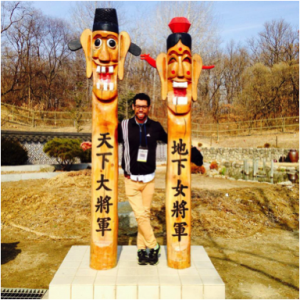 Story written by Seth Joyner, IEM, ’17
Story written by Seth Joyner, IEM, ’17
I grew up “mixed.” Whatever that means, right? My background in language learning comes from a Quebecois grandmother who spoke French and instilled a sense of pride in me for the language, while my mother, who had refused to learn French growing up, spoke to me in English.
Did I become fluent in a second language from an early age? Not even close. But I did, however, learn to mimic accents and the retained the basics well enough to fly through the typical American high-school language requirements.
So, why Korean? Well…to be honest it all started with wanting to make friends! I had just moved to Daegu, two hours south of the Korean capital, where not a lot of people spoke English. I had traveled before, but mostly just to other English-speaking countries. Languages really do open doors to new perspectives. It became a game. New vocabulary words were keys to different, more interesting conversations. I picked up my old  French books and even some Chinese while traveling through Asia over the next several years on vacations from English teaching.
French books and even some Chinese while traveling through Asia over the next several years on vacations from English teaching.
While abroad I met an expat who was old and wise in comparison to the young, spontaneous English-teachers that made up most of expat communities in Asia, myself included. He was a military linguist who was fluent in Farsi, Russian and Korean. I’ll never forget his words:
“You might just be different. Pick a place and really get to know it. I’ve been all over the world, alone, and I’m tired. Sometimes I wonder what it’d be like to just stay put.”
 Looking back on it, those words were the ones that made me decide to continue to push forward with Korean rather than being drawn to learn “a little bit of everything.” At the
Looking back on it, those words were the ones that made me decide to continue to push forward with Korean rather than being drawn to learn “a little bit of everything.” At the
Middlebury Institute and through Middlebury College, I’ve been able to do just that: be a solution to a problem. I hope to use my language affinity for non-profits advocating for human rights on the Korean peninsula. Non-regularly taught language programs mean you can design your own curriculum in order to learn precisely what you want and need to know. Have a goal. Dive into a passion. Achieve it.

